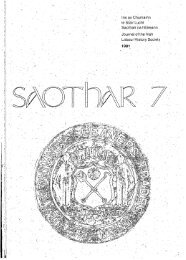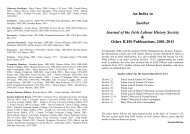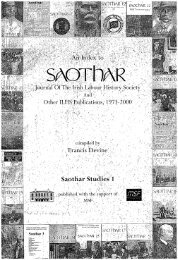You also want an ePaper? Increase the reach of your titles
YUMPU automatically turns print PDFs into web optimized ePapers that Google loves.
REMINISCENCE 115when Jim was present because the meeting was always lively. Jim had been Chairman of the HousingCommittee of the Corporation for years long before I joined it ... Following my first speech in theCorporation I had a complimentary letter from Dan Breenwho was a Fianna Fail Councillor at thetime. ll A comrade of J ames Connolly, he wanted to put me right in his view about the latter. He pointedout that Connolly was a Nationalist before a Sociruist! Somewhat later I wrote an inspection report forTB patients in Crooksling Sanatorium which exposed some shocking conditions. A special meeting of, the Public Health Committee was convened to discuss it. It was one of the last, if not the last such,meetings atterided by iim Larkin Senior. He nearly lifted the roof off City Hall with a roar of indignation.I discovered recently that the report is not aJt1ong,the Corporation ArchivesPThen there was the exchange with Alderman John McCarirtP There was a proposal·that twoCorporation houses be allocated to two priests at Clogher Road, Crumlin. The housing situation wasat the time desperate so I opposed the allocation. It gravely violated the conditions for Corporationhousing. I was, however, a lone voice. McCann expressed himself 'shocked' at my attitude. He wouldchallenge my stance at any street corner in Dublin at any time. It was 1949 and this was just devoutdemagogy. McCann was also hostile to the Producer/Consumer Market which the Corporation hadinitiated in response to the Lower Prices Campaign of the DTC. He alleged that it was not fair to businesspeople .. Then there was the Nelson Pillar episode in August, 1948. I moved at a City Council meeting thatthe statue of Lord Nelson be removed from the pillar and to the best of my recollection a Fianna FailCouncillor added an amendment which I accepted that he be replaced by a statue ofPadraic Pearse. Themotion was passed almost unanimously but was never acted upon because the pillar was privateproperty. I was then undergoing a very nationalistic phase but the motion wasn't one of my brightestideas. I received some hate letters. One of them sarcastically saluted me as t.he saviour of the sick, theold age pensioner and the unemployed. There were hostile editorials and Myles na Gopaleenlampooned me in his Irish Times column, ... even left wing associates didn't spare me. It was a salutary,sobering experience.From 1947 onwards Deasy became increasingly left-wing and subsequently grew disillusionedwith aspects of the Labour Party. This resulted in growing conflict between himself and hisfather. Thelatter was afraid that foe would eventually turn to Communism, a possibility which Deasy hadn'tconsidered at that stage of his life. Deasy, however, decided to stand as a Labour candidate in the 1948General Election which led to the Inter-Party Government.There were three of us standing as Labour Party candidates in Dublin South West as it was thencalled. I polled reasonably well. In fact on a humerous note, I might well have been elected if Clannan Poblachta hadn't rurt Sean MacBride in my area. He headed the poll taking the lion's share of theradical vote.While in theory Deasy approved of the intitial idea of an Inter-Party Government he was soon tochange his mind.At the time there was general approval among the left within the Labour Party for the Inter-PartyGovernment. It was not an exclusively Fine Gael alliance as the Government also included Clann naTalmhan and Clann na Poblachta and the latter was seen as a rather left wing party. In fact atone stageit was hoped that there might be an alliance between Clann na Poblachta and the Labour Party. Therewas also a further consideration in the shape of a threatened Wages Standstill Order. The trade unionmovement had very ugly memories of the Fianna Fail Wages Standstill Order during the war whe'1profits and prices were allowed to soar while wages were either at a standstill or else rigidlycontrolled. 14Within twelve months of the formation of the Inter-Party Government, I was strongly against the





